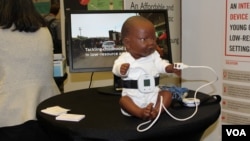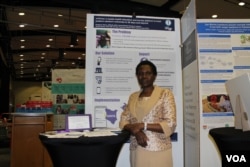Innovators from across the African continent were among 50 finalists in Washington showcasing solutions to maternal and newborn care challenges in the developing world recently.
The African doctors, scientists and inventors took part in Saving Lives at Birth, an annual event sponsored by the U.S. Agency for International Development (USAID), the Norwegian Ministry of Foreign Affairs, the Bill and Melinda Gates Foundation and other organizations.
Innovators and entrepreneurs had an opportunity to pitch their projects to a room full of their peers and experts, to meet mentors and find funding. They took questions about their proposals and explained their business models.
Wendy Taylor of USAID said the initiative has hosted over 650 innovators in the past six years.
Participants have “really built up a robust pipeline of over a hundred innovations, and so many of our existing grantees also come here," Taylor said. She is the director of USAID's center for accelerating innovation and impact.
Taylor said the grantees and this year's finalists displayed their innovations in an open-marketplace setting. They also interacted with each other and participated in workshops - in all, 280 different mentoring and partnering meetings.
Dr. Phelgona A. Otieno, principal research officer at the Kenya Medical Research Institute, came to Washington to present mThrive, an interactive mobile platform designed to ensure follow-up care and monitoring of babies delivered preterm, or prematurely.
In Kenya, barriers of distance and cost often mean that premature infants do not return for follow-up care after they have been discharged from the hospital, so very little is known about their progress.
“The fact that the health force in Kenya is very low [means] it’s very hard to reach out to these babies,” Otieno said. “This mobile platform is going to bridge this gap because it brings the health providers, the community health workers as well as the parents more or less on the same table, through this connectivity.”
An idea developed in Migori, Kenya, the platform aims to allow community health workers in villages and underserved neighborhoods to connect with doctors who generally practice in larger cities. One innovative aspect of mThrive is that it will allow community health workers to videotape a baby and share the video with doctors. It will also provide parents with educational messages and reminders about their child’s health, and ask diagnostic questions to see if follow-up care is required.
Although it is not operational yet, Otieno hopes to get funding to expand the mThrive project. She said the key is to track babies beyond 28 days, when they typically leave a doctor’s care but before some complications become noticeable. She would like to monitor the babies' progress for a year at first, and eventually for five years.
Another innovative maternal-health solution is Jhpiego, a non-profit health organization affiliated with Johns Hopkins University of Baltimore, Maryland. Espilidon Tumukurate, a senior technical adviser based in Uganda, said the group is devising a screening tool to combat maternal sepsis, the third main cause of maternal mortality.
Maternal mortality in Uganda is stubbornly higher than in many other developing nations: during 100,000 births, about 343 mothers die. That rate has dropped in recent years, but Tumukurate says it is "one of the major problems, and we haven’t attained Millennium Development Goals, so there is ... urgency.”
Jhpiego developed a simple, cost-effective solution so health-care workers can detect which mothers are likely to develop sepsis and give them targeted treatment to prevent infection. Tumukurate said it amounts to a checklist that asks simple questions, such as how long the mother was in labor, whether there was a membrane rupture and whether the mother experienced fever.
“To ask all of these would give us kind of a red flag to show that this woman should be kept longer in the hospital and provided appropriate treatment,” he said. “We feel this tool would help us to be able to tailor our treatment to clients who need it, rather than currently the tendency of indiscriminate use of antibiotics that sometimes are given to people who don’t need them, or those people who need them but don’t get antibiotics appropriate to the risk they are exposed to.”
The Johns Hopkins-backed program is planned to begin in two Ugandan regional hospitals, working together with Uganda’s ministry of health. “Jhpiego is providing technical leadership and we think afterwards we will be able to scale the tools nationally. We will be able to save lives at birth,” Tumukurate said.
Although a lack of funding and resources often affects quality health care, culture also plays a role in many parts of Africa.
A unique solution to this issue comes from the Development Research and Project Center (DRPC) in northern Nigeria's Kano City, which seeks to build capacity for maternal, neonatal and child health. Aminu Gamawa of DRPC said misunderstandings about Islamic teaching regarding family planning and birth care lead to adverse outcomes and even death among women and newborns. In its research, DRPC identified 14 Islamic scholars and 28 apprentices preaching against maternal, neonatal and child health best practices. The center seeks to change that.
“What we are doing is we are engaging Islamic opinion leaders in northern Nigeria and training them to become champions for maternal and neonatal health,” Gamawa said. “We have been training many Islamic scholars who are also training health workers on the importance and needs for women’s reproductive health and rights to be respected. For women to be allowed to have access to prenatal, neonatal and postnatal care... The goal is to save lives and we all have a role to play.”
DRPC found that in northern Nigeria, Islamic leaders play a vital role in shaping perceptions and behavior across the community. By bringing them on board and teaching them to endorse best practices of maternal and child care, the impact spreads quickly.
“We believe that pregnancy is not a disease. Pregnancy should be a moment of joy, and no woman should die because she is pregnant, and no child should die during childbirth,” Gamawa said. “That’s why we are doing this. I lost my mother during childbirth. I lost my sister during childbirth. And I believe that if we come together and work with the stakeholders in the community we are going to make a difference.”









